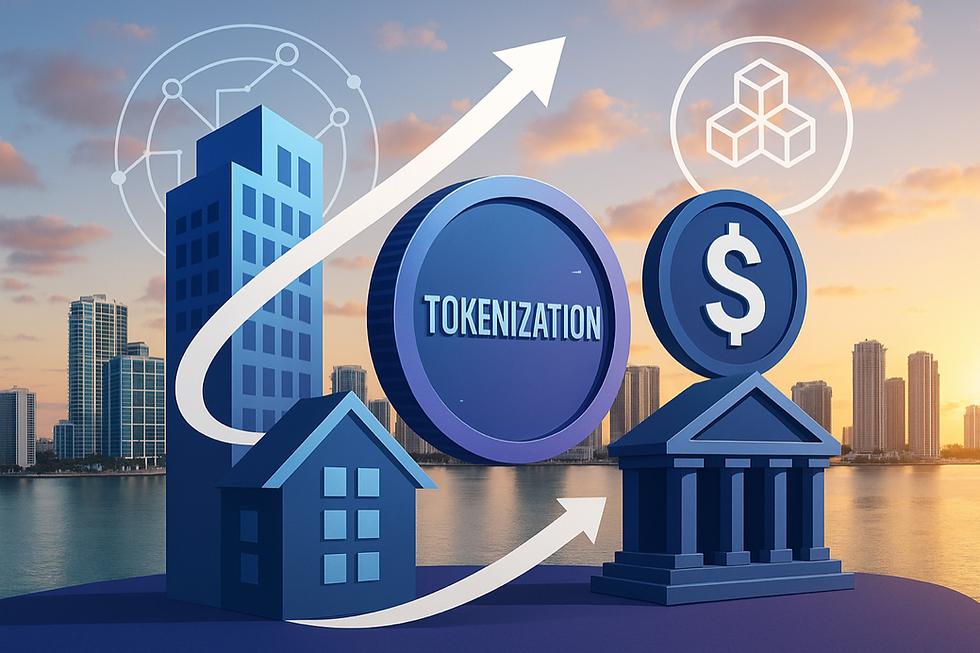Revolutionizing Real Estate: How Blockchain Is Democratizing Access and Enhancing Transparency
- Meggen Harris

- Sep 18, 2025
- 4 min read
Updated: Sep 25, 2025

The real estate industry, long known for high barriers to entry, slow transactions, and lack of transparency, is undergoing a major transformation. Blockchain technology—with its decentralization, automation, and security—has emerged as a catalyst for change. By combining real estate tokenization and smart contracts, blockchain is making property investing more accessible, efficient, and transparent for a wider range of investors.
Real Estate Tokenization: Fractional Ownership & Liquidity Explained
One of the most significant innovations in blockchain real estate investing is tokenization. Tokenization converts property ownership rights into digital tokens recorded on a blockchain. Each token represents fractional ownership, enabling investors to buy small shares of properties instead of entire assets.
Traditionally, real estate investing required large amounts of capital, which excluded many would-be investors. Tokenization breaks this barrier, allowing participation with far smaller amounts—sometimes as little as $50—making fractional real estate ownership possible for the first time at scale.
Even more importantly, tokenization introduces liquidity to an illiquid market. Traditional property transactions can take months to complete, with brokers, lawyers, and multiple intermediaries involved. Tokenized real estate can be traded on digital asset exchanges, providing a faster, simpler way to enter or exit a position.
Examples of Tokenized Real Estate Platforms
RealT, one of the leading real estate tokenization platforms, allows global investors to buy fractional shares of properties and earn rental income in stablecoins. By tokenizing shares of LLCs that hold title to properties, RealT provides a model for accessible and liquid real estate investing.
Smart Contracts in Real Estate: Automating Trust & Transactions
Another key driver of blockchain adoption is the rise of smart contracts—self-executing agreements coded on the blockchain. These contracts automatically handle key processes such as:
Ownership transfers
Rental income distribution
Compliance and reporting checks
Because smart contracts execute only when pre-set conditions are met, they remove the need for many intermediaries, reduce costs, and streamline transactions.
How Smart Contracts Benefit Investors
Transparency: Every transaction is recorded on a public ledger.
Efficiency: Manual processes like rent collection are automated, saving time and lowering fees.
Trust: Code-based execution removes human error and ensures timely payouts.
Blocksquare is a notable example, offering an EU-compliant real estate tokenization framework that integrates with land registries. This gives token holders legally enforceable claims—an important step toward regulatory clarity and investor confidence.
Economic Impact of Blockchain Real Estate Investments
According to McKinsey & Company, blockchain applications in real estate can reduce property management costs by up to 20%. They project that the total tokenized market across asset classes could reach $2 trillion by 2030, with real estate emerging as a leading sector.
This combination of fractional ownership, global participation, and cost efficiency is creating an entirely new market for blockchain real estate investing.
Challenges of Tokenized Real Estate & Investor Considerations
Despite the promise, there are important factors investors must weigh:
Regulation & Compliance: Governments are still developing legal frameworks for security tokens and digital assets.
Cybersecurity: While blockchain is secure, platforms and smart contracts can still be vulnerable to exploits.
Education & Adoption: Many investors need guidance to fully understand tokenized asset risks, custody options, and liquidity dynamics.
As frameworks mature and security practices strengthen, these barriers are expected to diminish, paving the way for broader adoption.
The Future of Blockchain Real Estate Investing
Blockchain technology is reshaping real estate by making it more transparent, efficient, and inclusive. Real estate tokenization lowers entry barriers, fractional ownership opens global participation, and smart contracts automate previously manual processes.
For investors, this means access to a more liquid, more transparent, and potentially more profitable way to build a diversified real estate portfolio. As the market matures, blockchain-powered real estate platforms will likely become a mainstream component of global property investment strategies.
References:
Blocksquare. "Blocksquare launches EU-compliant real estate tokenisation framework." dig.watch, February 7, 2025.
Blocksquare. "Tokenization infrastructure for real estate." blocksquare.io.
CoinTribune. "RealT: How Blockchain Is Revolutionizing Real Estate." cointribune.com, May 4, 2025.
Hani, Makram. "The Future of Real Estate Is Tokenized — Makram Hani, COO of BlockSquare, Explains." blockster.com, May 23, 2025.
McKinsey & Company. "From ripples to waves: The transformational power of tokenizing assets."mckinsey.com, June 20, 2024.
Proptech Connect. "Blocksquare, Vera Capital Ink Deal to Tokenize $1B in US Real Estate."proptechconnect.com, April 22, 2025.
Request Finance. "Tokenizing a Real Estate Empire with RealT." request.finance.
Disclaimer: This blog post is for informational purposes only and does not constitute an offer to sell or a solicitation of an offer to buy any securities. Investment opportunities referenced herein are intended solely for accredited investors and may be offered only through appropriate offering documents. Past performance is not indicative of future results. Investing involves risk, including the possible loss of principal. Participant Capital does not provide tax or legal advice; individuals should consult their own advisors to understand the potential tax consequences. Views expressed are those of the authors and do not necessarily reflect the official views of Participant Capital or its affiliates.




Comments